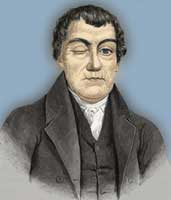Christmas Evans & Sandemanianism 1: Another Gospel
 This is a series I have considered for a long time. It is also a series which I take no pleasure in writing, which is perhaps why it has been so long in gestation. I take no pleasure in engaging in controversy, especially not with fellow-Christians, and I understand that, in undertaking to write this series, I shall be seen to be doing just that. However, I feel it to be 'a word in season.' I have recently become aware of the existence of a movement which under the title ‘Free Grace Theology,’ holds that saving faith consists solely in mental assent to the truths of the Gospel (for more see Jenson's Blog). This has been seen before, and its effects on the Church of Jesus Christ were in no way beneficial.
This is a series I have considered for a long time. It is also a series which I take no pleasure in writing, which is perhaps why it has been so long in gestation. I take no pleasure in engaging in controversy, especially not with fellow-Christians, and I understand that, in undertaking to write this series, I shall be seen to be doing just that. However, I feel it to be 'a word in season.' I have recently become aware of the existence of a movement which under the title ‘Free Grace Theology,’ holds that saving faith consists solely in mental assent to the truths of the Gospel (for more see Jenson's Blog). This has been seen before, and its effects on the Church of Jesus Christ were in no way beneficial.It bears the name, not of its founder, but of its most energetic proponent, one Robert Sandeman. Originating in Scotland, these ideas came to Wales from 1765 onwards, into the societies created by the Great Awakening and into Dissent some three decades later. Now:
Sandemanianism had arisen in Scotland in the 1720s chiefly in reaction against what was felt to be an unhealthy reliance on the authority of man-made creeds. Its founder, John Glas, a Church of Scotland minister in the county of Angus, disagreed with the custom of requiring all ministers to sign the Solemn League and Covenant (a document pledging the Church to maintain Presbyterianism). He believed that requiring a person to submit to a man-made document was wrong and so also refused to subscribe to the Westminster Confession.[1] Finally and most significantly, he held some unorthodox views on the nature of saving faith. This was enough to get him deposed from his charge in 1733. He formed an Independent Church.[2] Glas himself was a man of loving and warm temper, and no doubt his evident holiness did much to persuade others of his system.[3]
In the course of the years, this Independent church and the churches that followed it adopted a number of characteristic practises. In an attempt to return to primitive Christianity the Churches adopted the practice of ‘breaking bread’ every Lord’s Day, as the Plymouth Brethren do. All man-made creeds were rejected, as was the idea of a paid, full-time ministry. Ministers were expected to work during the week to support themselves, although full-time evangelists were maintained by a general fund.[4] Other customs were re-introduced, including foot-washing and the ‘Holy Kiss.’[5]
[1] Given that Glas refused to subscribe to the articles and practice of his church, had he been in a Free Church, rather than an established Church, he should have withdrawn citing conscience rather than continuing to draw a stipend. Only the fact that Glas was a minister of the establishment exonerates him from the charge of bad faith.
[2] D. Martyn Lloyd-Jones, ‘Sandemanianism’, in The Puritans: Their origins and Successors (Edinburgh, 1987), pp.171-2.
[3] Tim Shenton, Christmas Evans: The Life and Times of the one-eyed Preacher of Wales (Darlington, 2001), p.155. It is often the case that heretics exhibit a high degree of holiness in their personal lives. Witness Arius of Alexandria, whose personal sanctity was the best advertisement of his damnable error.
[4] J. Hugh Edwards, MP, The Life of David Lloyd George with a Short History of the Welsh People (London, 1913), vol.ii, pp.65-7.
[5] D. Martyn Lloyd-Jones, ‘Sandemanianism’, in The Puritans: Their origins and Successors (Edinburgh, 1987), p.172.

2 Comments:
Anyway, from some of the comments I received from someone (I deleted them all), some of the proponents of the Free Grace (or Non-Lordship) Movement do not realise that their movement is just an old heresy with new garments.
Thanks for bringing reminding us about this. Looking forward to reading the rest.
I don't blame you for deleting them. I'm afraid they are horribly deluded. Their comments were not Christ honouring. I read on one of their sites that they believe that apostates will go to heaven.
That a man who dies blaspheming God can go to Heaven? From such false teachers, good Lord deliver us! These people are as bad as Liberals, 'having a form of Godliness but denying the power thereof.'
No holiness, no heaven!
Post a Comment
<< Home